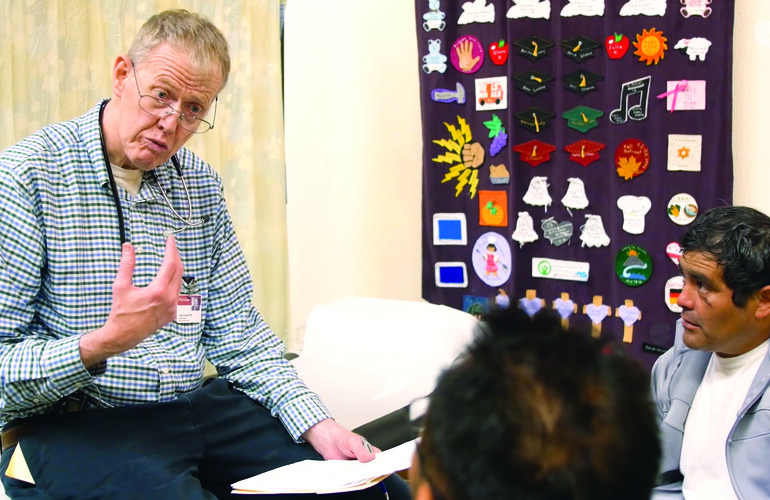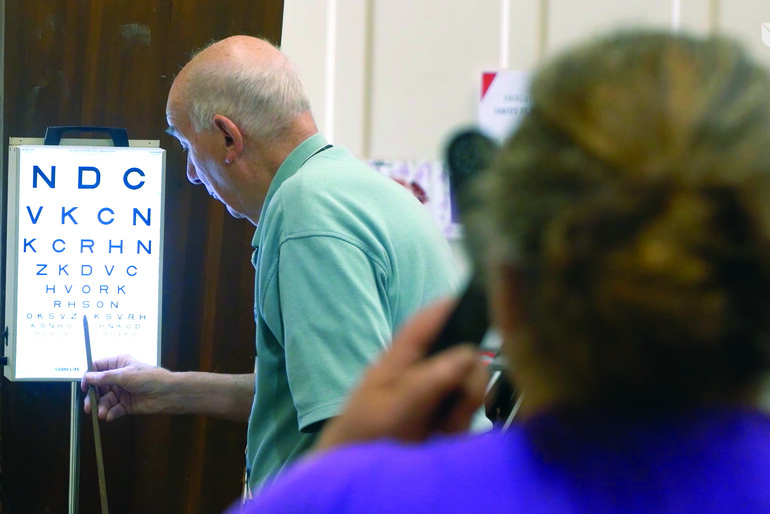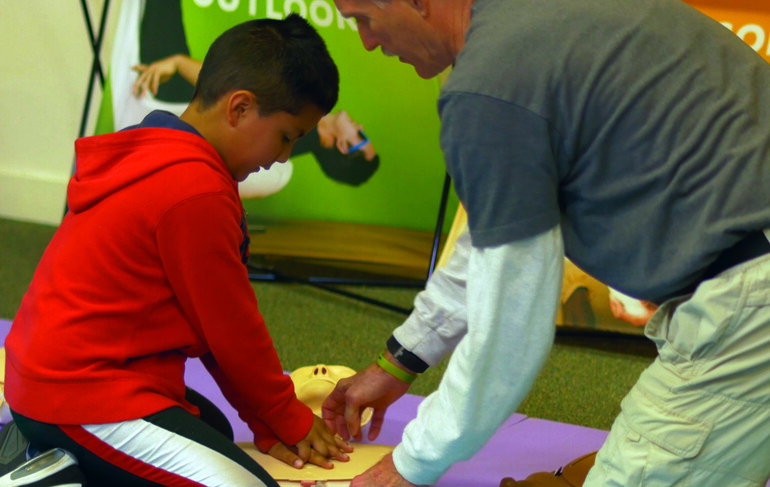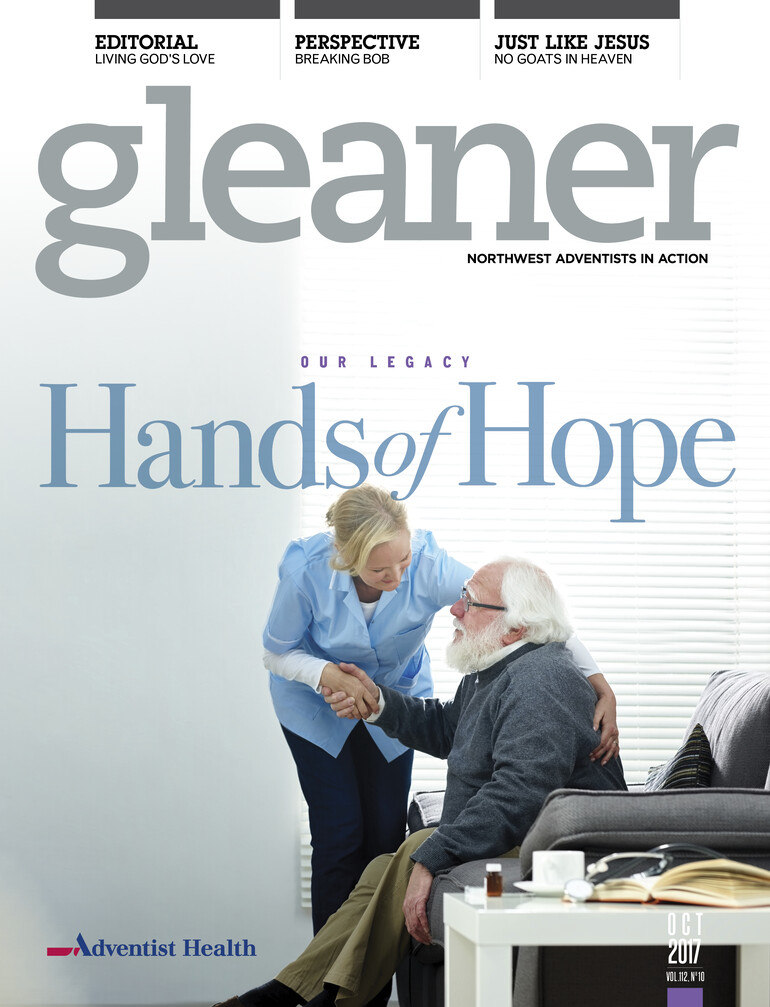Early one Saturday morning in June, several hundred underinsured people lined up around the perimeter of a church in east Portland, Oregon, hoping to obtain medical attention and secure one of just a few spots available for the mobile dental clinic. Many of these people represent the working poor in the community. Elizabeth, a mother of seven children, prayed her youngest son, William, would be able to have a cavity filled and address his health concerns.
As the doors opened, men, women and children gathered in the church’s multipurpose room to begin filling out paperwork. One by one, people were called back to see physicians, nurses, dentists and chiropractors or to get their vision screened and even receive a haircut.
While William waited to see the dentist, he bravely sat in the chair to get his shaggy hair cut. For most people, getting a haircut is no big deal, but for William it was a momentous occasion. His father explained this was only William’s second haircut. Due to his sensitivities to noise, the hair clippers always bothered him, but that morning William grinned from ear-to-ear as the barber handed him a sucker for his bravery.
Elizabeth and her family have attended several Compassion Clinics, specifically for pediatric dental care. “We’re right on that borderline for income. We have a little insurance but also huge deductibles and copays,” she says. “With multiple kids it really starts to add up. I’m so excited that the oldest kids are finally cavity free.” Gratitude freely spilled from her soul as she found a place of hope for her family.
Each year Adventist Health in Portland engages in a large number of community health fairs because the mission of living God's love by inspiring health, wholeness and hope extends far beyond the walls of hospitals or doctors' offices.
In Elizabeth’s case, the care she received from Adventist Health occurred in collaboration with Compassion Connect. The group is committed to working with local churches to serve others and lift up Christ through health and dental clinics. For years the group specialized in a large annual event but asked the hospital to partner with them to address community needs on frequent basis at times and locations most convenient for the working poor.
Together, Adventist Health and Compassion Connect are now inspiring hope through a network of mini clinics. The network’s goal is to offer quarterly mini medical/dental clinics each year throughout various communities in the Portland metro area where chronic health problems and social needs are great and resources are limited.
Ed Hoover, Adventist Health Portland’s community wellness manager, has been integrally involved with Compassion Connect for more than 10 years. He’s excited about the opportunities that come from more frequent connections with community partners and neighbors. “This is ministry the way Jesus did it,” says Hoover. “His compassionate healing ministry occurred whenever and wherever people gathered seeking help.”
The mini clinics are also an intimate space — perfect for allowing Adventist Health Portland team members, volunteers and others to live God’s love.
“Volunteer prayer teams care for the spiritual needs of guests, which is just as necessary as the care they receive for their physical needs,” says Hoover. “These events are just bathed in prayer.”
Before the clinic begins, volunteers gather for orientation and a time of prayer. “I always think, wow, this is really terrific stuff,” says John Loomis, a doctor who works at the Adventist Health Portland urgent care clinic in the underserved Rockwood neighborhood and has been a regular Compassion Connect volunteer for years. “You just know the Lord God is looking down favorably on our work.”
Loomis enjoys having the freedom to spend as much time with each person as they need. “We talk and share and enjoy each other first, and then talk about their health problems. But really, most of it is education around wellness, their health and how to navigate the complex American health care system.”
He continues, “I do provide medical care, but it’s actually less important than our work to get them connected to more frequent access to care and to build those ongoing relationships.”
In the future, Adventist Health Portland hopes to connect food-insecure families to community resources, as well as provide appropriate referrals to Adventist Health clinics, medical center or other health services in order to help communities live well together. Partnership and teamwork are a core component of all Compassion Clinics and opportunities to expand are endless.
“We partner with local churches and many Christian volunteers. In fact, a lot of the fun for me is mixing with the other volunteers. We have people from everywhere volunteering as translators, barbers, people in charge of snacks. I enjoy getting to know their background and why they have a heart for service. That’s my big shot in the arm,” says Loomis.
The other big takeaway from Loomis’ experiences? “Opportunities to volunteer are out there," he says. "You don’t have to be a specialist or expert at anything — you just need to show up and be part of the fun and show that you care. Just do it."












